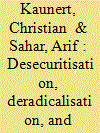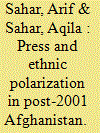| Srl | Item |
| 1 |
ID:
183899


|
|
|
|
|
| Summary/Abstract |
This article assesses the processes and trends of desecuritisation through the deradicalisation of identity politics within the higher education sector in Afghanistan. It examines the desecuritisation of radicalisation through efforts directed at deradicalisation in the context of a securitised conflict environment. The article draws on the data generated through interviews and discussions with actors engaged with higher education. Higher education, while manipulated by numerous actors for ideo-political purposes, can function as a ‘desecuritisation’ and ‘deradicalisation’ mechanism by supplementing the statebuilding efforts, and more subtly, by providing a venue for critical teaching and learning processes. This article highlights that while the sector is typically a very low reconstruction priority, if addressed strategically, it has the potential to contribute to the desecuritisation of ethnic politics through the deradicalisation of ethnic grievances and hence function as a catalyst for effective and sustainable postwar recovery.
|
|
|
|
|
|
|
|
|
|
|
|
|
|
|
|
| 2 |
ID:
183030


|
|
|
|
|
| Summary/Abstract |
This article evaluates the political dynamics of the 2014 presidential election to explore the sense of nationhood that could have formed in post-2001 Afghanistan and to gauge its strength. It examines frontrunner candidates – Mohammad Ashraf Ghani and Abdullah Abdullah’s – campaign rhetoric and processes they utilized to manipulate ethnic identities for political ends. Ethnic identities sharpened by ideological and political polarisation during the civil war (1978–2001), continue to play a critical part in the political economy dynamics of post-2001 era. With the popular patriotic idea of citizenship remaining weak, the abundance of ethnic identities provides a paradigm around which power contenders articulate messages that easily feed into popular perceptions of “us” and “other”. The article contextualizes representative and consociational democracy exploring whether these models of democracy offer any solution to social cleavages in Afghanistan. It argues that elites’ manipulation of ethnic identities and distribution of resources through ethnic shares (Bonn Conference 2001, National Unity Government (NUG) 2014) might reinforce ethnic boundaries, leading to deeper consolidation of ethnic divisions.
|
|
|
|
|
|
|
|
|
|
|
|
|
|
|
|
| 3 |
ID:
144165


|
|
|
|
|
| Summary/Abstract |
This article analyses the contents of three newspapers affiliated with the Tajik-dominated Jamiat and Shura-e-Nezar factions that were deployed during the 2014 presidential election to publicize ethno-political polarization for instrumental ends. The practice of nurturing ethnic identities serves as a microcosm of the broader context in which identity politics, besides coalition-building, rent-seeking, and patrimonial interdependencies, has become a key feature of post-2001 politics. This article focuses on how these factions used these newspapers to polarize ethnic cleavages to win legitimacy for themselves and defamation for their Pashtun-dominated rival factions – Hezb-e-Islami Gulbuddin and the Taliban. It will be years before the ethnic mujahedeen and muhajereen and the new generation reach a mutually binding and working condition that facilitates the country's long-term stability. Reaching this condition is critical because the future of Afghanistan lies in the commitment of its people to form a united community that resolves disputes in the manner of a democratic nation.
|
|
|
|
|
|
|
|
|
|
|
|
|
|
|
|